Trump-Putin summit in Alaska ends with no deal on Ukraine ceasefire

- President Trump and Russian President Vladimir Putin met in Alaska on Friday for a high-stakes summit on ending the war in Ukraine, but the talks failed to produce the ceasefire that Mr. Trump had sought.
- The two leaders, along with a pair of top aides each, met for nearly three hours at Joint Base Elmendorf-Richardson in Anchorage after a carefully choreographed welcome that included a red carpet and military flyover.
- In brief remarks afterward, Putin alluded to unspecified "agreements," while Mr. Trump called the meeting "extremely productive." Neither leader, however, mentioned a halt to the fighting in Ukraine. The summit ended early without a planned meeting between a broader group of officials.
In an interview taped in Alaska after his meeting with Putin, Mr. Trump told Fox News' Sean Hannity it's "up to Zelenskyy" now to get a deal done.
"Now it's really up to President Zelenskyy to get it done," the president told Hannity. "And I would also say the European nations, they have to get involved a little bit. But it's up to President Zelenskyy. I think we are, and if they like, I'll be at that next meeting."
Zelenskyy has supported a ceasefire agreement in order to meet and discuss a peace agreement, but Moscow has shot down the idea.
Mr. Trump said he and Putin agreed on most things, but there are still one or two issues on which they disagree. Asked if he will say what those disagreements are, Mr. Trump responded, "No, I'd rather not."
Mr. Trump said he believes Putin wants the war to end, despite evidence to the contrary.
"It's not a done deal at all," Mr. Trump said. "And Ukraine has to agree. President Zelenskyy has to agree."
When Hannity asked Mr. Trump for his message to Zelenskyy, the president responded," Make a deal."
Mr. Trump said he thinks Putin wants to make a deal, and said he thinks they're close to a deal, without saying what such a deal might look like.
"I think we're pretty close to a deal," he said. "Look, Ukraine has to agree to it. Maybe they'll say no."
Hannity reminded Mr. Trump of the president's warning earlier this week of "severe" consequences for Putin, suggesting that to Putin, severe consequences for Russia would mean other large countries are punished for buying Russian oil. Mr. Trump had previously threatened severe economic consequences for Russia if it didn't agree to a ceasefire deal after the Alaska meeting.
"Because of what happened today, I think I don't have to think about that," he said. "Now, I may have to think about it in two weeks or three weeks or something. But we don't have to think about that today. I think the meeting went very well."
Shortly after 4 p.m. local time, Mr. Trump walked up the stairs to Air Force One and waved before his seven-hour flight back east.
In the original White House schedule, Mr. Trump was expected to leave at 5:45 p.m. — an indication of just how much the talks were cut short.
The talks in Alaska appear to have come to an end without a planned luncheon between U.S. and Russian officials.
The Kremlin posted a video of Putin shaking hands with Mr. Trump and said the talks had concluded. The Russian leader's motorcade was then spotted pulling up to his plane.
Mr. Trump is now doing an interview with Fox News' Sean Hannity, the White House said.
John Sullivan, a CBS News contributor who served as U.S. ambassador to Russia from 2020 to 2022, said on the CBS News Special Report that the leaders' statements were "a nothingburger."
"I mean, where's the beef?" Sullivan asked. "There's nothing there. They could have issued these statements on Inauguration Day, Jan. 20 of this year. It's now the middle of August. The Trump administration keeps talking about wanting to get a signal from President Putin about whether he's serious about peace. Putin said nothing today concretely that would indicate that he is serious about achieving peace in Ukraine."
The ambassador said that "if this is all that happens, if this statement is it — there aren't going to be further meetings, there aren't going to be further briefings, etc. — it was a whole lot of to-do about nothing."
It wasn't immediately clear whether officials were holding further meetings, or if the summit was over.
As the U.S. president concluded his brief remarks, he told Putin, "We'll speak to you very soon."
In English, Putin responded: "Next time in Moscow."
"Oh, that's an interesting one," Mr. Trump said. "I don't know. I'll get a little heat on that one. But I can see it possibly happening."
Both Mr. Trump and Putin thanked reporters before exiting the stage, refusing shouted questions from reporters.
After Putin concluded his remarks, Mr. Trump began by saying the two leaders had a "very profound" and "extremely productive" meeting. "Many points were agreed to," Mr. Trump said, saying he and Putin agreed on "most points."
"There were many, many points that we agreed on, most of them, I would say," Mr. Trump said. "A couple of big ones that we haven't quite gotten there but we've made some headway. So there's no deal until there's a deal. I will call up NATO in a little while. I will call up the various people that I think are appropriate. I will of course call up President Zelenskyy and tell him about today's meeting."
Mr. Trump reiterated his view of the talks later in his statement: "We had an extremely productive meeting, and many points were agreed to. There are just a very few that are left. Some are not that significant. One is probably the most significant, but we have a very good chance of getting there. We didn't get there, but we have a very good chance of getting there."
The president took no questions from the press.
"We're going to try and get this over with. We really made some great progress today," Mr. Trump said.
In his remarks, Putin hinted that the two sides have reached agreements in their talks, but did not specify what they entailed.
Putin said U.S.-Russia relations have "fallen to the lowest point since the Cold War." The Russian leader said Mr. Trump wants to get to the "crux of the matter" of the conflict in Ukraine.
Putin, who launched the invasion of Ukraine in 2022, said the "situation in Ukraine has to do with fundamental threats to our security."
Putin said he is convinced that in order to make any settlement lasting long term, "we need to eliminate all the primary roots, the primary causes of that conflict."
He also hinted that he wants to normalize relations with the U.S. more generally.
"I expect that today's agreements will be the starting point not only for the solution of the Ukrainian issue but also will help us bring back business-like and pragmatic relations between Russia and the U.S.," Putin said.
Putin, the aggressor in his country's war on Ukraine, also said he agreed with Mr. Trump's oft-repeated comment that Russia wouldn't have launched a full-scale invitation of Ukraine if he were president instead of former President Biden when it began.
Against a backdrop that says "Pursuing Peace," Mr. Trump and Putin took to their respective lecterns. Mr. Trump allowed Putin to begin.
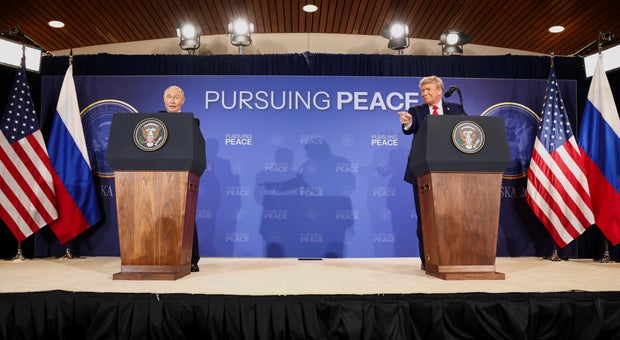
Through a translator, Putin said they had "thorough" negotiations that were quite "useful."
"Our negotiations have been held in a constructive atmosphere of mutual respect," Putin said.
Putin noted how close Alaska and Russia are, and said he called Mr. Trump "neighbor" upon his arrival.
The first meeting of the summit lasted nearly three hours. The meeting with the leaders and two key aides on both sides got underway at about 11:30 a.m. local time, and the Kremlin said it ended at about 2:15 p.m.
The meeting was supposed to be followed by an expanded lunch session with more officials, but Mr. Trump and Putin appear to be moving ahead with their press conference. It's unclear whether the lunch has been scrapped or if talks will continue after hearing from the presidents.
The Kremlin said the first meeting between the two leaders has ended, and the press conference with both Mr. Trump and Putin will begin shortly.
Members of the White House pool — the media traveling with the president — have been told to gather in the room set up for the Trump-Putin press conference.
Cameras showed a flurry of activity in the room, where two lecterns are on a stage in front of a backdrop with the slogan "Pursuing Peace."
The two sides have now been behind closed doors for two hours. The wider lunch meeting has not yet started, according to Dan Scavino, a Trump aide.
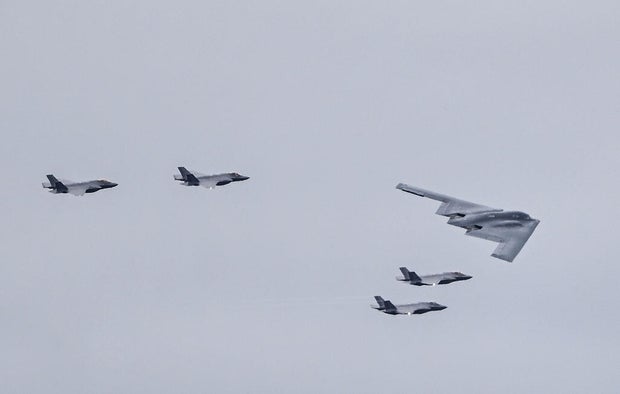
The military flyover as Mr. Trump and Putin arrived included four F-35s based out of Eielson Air Force Base in Alaska and a B-2 from Whiteman Air Force Base in Missouri, a U.S. official tells CBS News.
There were F-22s from the 3rd Wing at Joint Base Elmendorf-Richardson and a second B-2 on the tarmac when the leaders arrived, this official said.
B-2 bombers were used in the U.S. strikes on Iranian nuclear sites in June, when they flew from their base in Missouri to Iran to carry out what officials said was the "largest B-2 operational strike in U.S. history."
Hillary Clinton, the former secretary of state and Mr. Trump's former rival on the campaign trail, said in a podcast appearance Friday that if Mr. Trump can secure an end to the war in Ukraine without ceding territory to Russia, she would nominate him for the Nobel Peace Prize herself.
Clinton made the comments on the podcast "Raging Moderates" with Jessica Tarlov.
"Honestly, if he could bring about the end to this terrible war, where Putin is the aggressor, invading a neighbor country, trying to change the borders — if he could end it without putting Ukraine in a position where it had to concede its territory to the aggressor, had to, in a way, validate Putin's vision of greater Russia, but instead could really stand up to Putin, something we haven't seen, but maybe this is the opportunity," Clinton said.
She added that this must mean a ceasefire and Russia withdrawing over time from the territory it's seized. "If we could pull that off, if President Trump were the architect of that, I'd nominate him for a Nobel Peace Prize, because my goal here is to not allow capitulation to Putin, aided and abetted by the United States."
Clinton added: "I'm dreaming that for whatever combination of reasons, including the elusive Nobel Peace Prize, President Trump may actually stand up to Putin on behalf of not just Ukraine and its democracy and its very brave people, but frankly, on behalf of our own security and interests."
Mr. Trump, whose supporters chanted "lock her up" about Clinton during the 2016 presidential election, told Fox News' Bret Baier it was "very nice" of Clinton to say that, and, "I might have to start liking her again."
Read more here.
The first meeting between the two leaders and their aides has been going on for about an hour, with no news from inside the room. The meeting began at approximately 11:27 a.m. local time (3:27 p.m. EDT).
Here's who is in the meeting for the U.S., along with an interpreter:
- President Trump
- Secretary of State Marco Rubio
- U.S. special envoy Steve Witkoff
And for Russia:
- President Vladimir Putin
- Foreign Minister Sergey Lavrov
- Yuri Ushakova, Putin's foreign policy adviser
John Sullivan, former U.S. ambassador to Russia and a CBS News contributor, Mr. Trump's greeting of Putin, including the red carpet and military flyover, was an "extraordinary scene."
"The way this was scripted, with the two presidential aircraft arriving, the red carpet, President Putin riding in President Trump's limousine … that surprised me," Sullivan said. "It's a level of respect that the American president is showing to the Russian president. It struck me as an arrival that would be worthy of an ally, instead of a country and a Russian president that considers the United States its enemy, or, at best, its adversary."
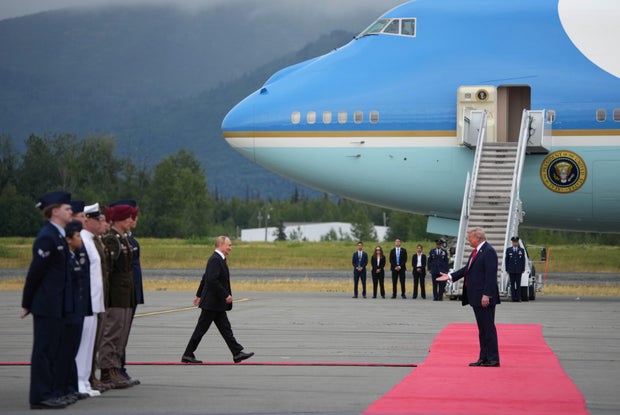
Sullivan acknowledged that Mr. Trump may be trying to "flatter" Putin as a negotiating tactic.
"I think what President Trump would say in response to what I just said is, 'Look, I want to make an impression on Putin. I want to get results for the United States. Well, of course I'm going to treat him this way. You criticize me because other leaders try to flatter me, well, I'm flattering Putin, because I want something from him, which is peace in Ukraine,'" Sullivan said.
The length of the talks will likely depend on how the meetings play out and how much progress the two sides make on the lengthy list of agenda items before them. A Kremlin spokesman predicted earlier in the day that the talks could take six or seven hours.
The current bilateral meeting is expected to be followed by a lunch meeting that will include more officials, including Treasury Secretary Scott Bessent, Commerce Secretary Howard Lutnick, Defense Secretary Pete Hegseth and chief of staff Susie Wiles. The joint press conference with Mr. Trump and Putin is expected after that expanded meeting.
The official White House schedule said the president was slated to leave Alaska at 5:45 p.m. local time, or 9:45 p.m. EDT. In that scenario, he would return to the White House at about 4:30 a.m.
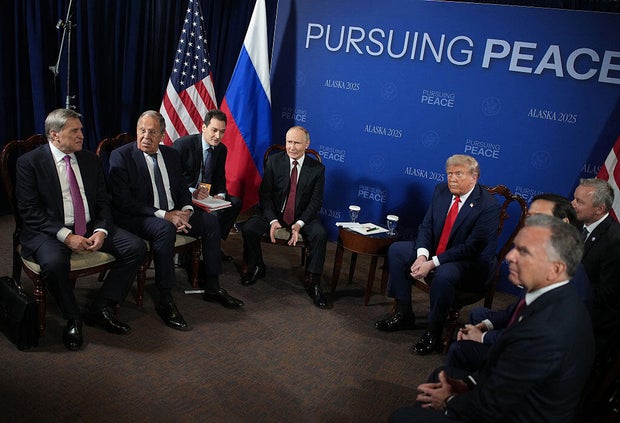
In a chaotic moment, reporters were rushed into and out of a room where Mr. Trump and Putin were beginning their bilateral meeting alongside top aides.
Again, Putin declined to answer reporters' questions, including, "Will you agree to a ceasefire?" And, "Will you commit to not killing any more civilians?" Putin is very rarely subject to questions from foreign reporters.
Mr. Trump also declined to take questions.
Rubio, Witkoff and a translator were seated alongside Mr. Trump, while Russian Foreign Affairs Minister Sergey Lavrov, foreign policy adviser Yuri Ushakova and a translator were seated alongside Putin.
Speaking on the CBS News Special Report as Mr. Trump and Putin got into the presidential limo, former U.S. Ambassador to Russia and CBS News contributor John Sullivan compared the arrival ceremony with the last time Putin met with a U.S. president.
"I contrast it with the last meeting that Putin had with an American president, with President Biden in Geneva four years ago. The two presidents arrived at a home in Geneva, they shook hands on the front steps and went into a meeting with their secretary of state and Russian foreign minister," Sullivan said. Sullivan was the ambassador in Moscow from 2020 to 2022.
"It was nothing like this spectacular scenery, with planes arriving, fighter jets flying overhead and the two presidents riding together in the limousine of the president of the United States," he continued. "This really is an extraordinary stagecraft that the United States has put together for President Putin."
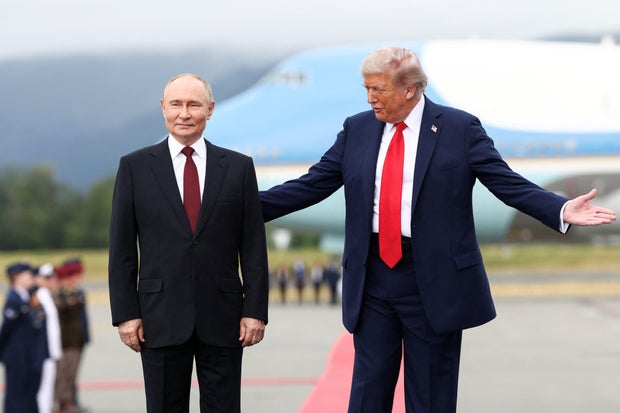
Sullivan noted that other presidents have met with Russian and Soviet leaders on their own, highlighting Ronald Reagan's meetings with Mikhail Gorbachev. He said Putin's English is proficient enough for him to be able to talk to Mr. Trump without an interpreter.
"Putin's English is much better than he lets on. He's not as fluent in English as he is in German, he can converse with the German chancellor in flawless German," Sullivan said. "His English isn't quite as good, but he could have a conversation with the president in English that President Trump would understand."
In a carefully choreographed moment, Mr. Trump descended the steps of Air Force One moments before Putin came down the steps of his plane, stepping onto U.S. soil for the first time in about a decade.
Both Mr. Trump and Putin walked down their respective red carpets, with Mr. Trump waiting for Putin at the end and clapping. Both Mr. Trump and Putin extended their hands and shook, patting each other on the arm and exchanging words as they smiled.
The two ascended the platform in front of the fighter jets where they shook hands again. Neither Mr. Trump nor Putin answered shouted questions from reporters. A B-2 stealth bomber and several other fighter jets flew overhead.
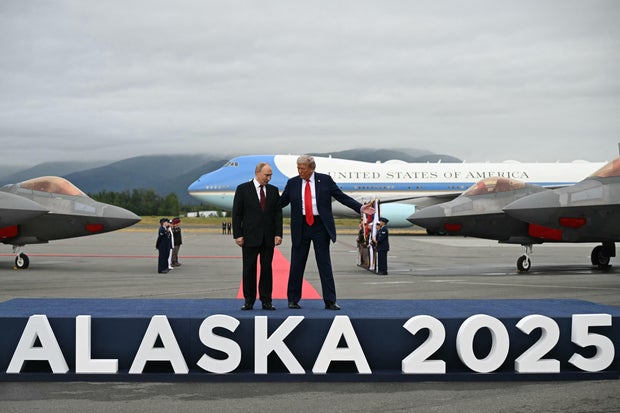
In an unusual moment, Putin joined Mr. Trump in his presidential limo, known as the Beast, with seemingly no aides or interpreters with them. Putin smiled as the vehicle began to drive away.
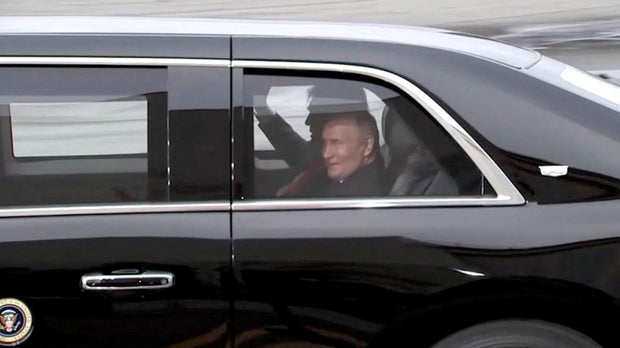
A crowd of supporters gathered in Anchorage for a rally in solidarity with Ukraine ahead of the meeting between President Trump and Russian President Vladimir Putin. Demonstrators waved blue-and-yellow Ukrainian flags and held signs saying "Support Ukraine" and "No compromise."
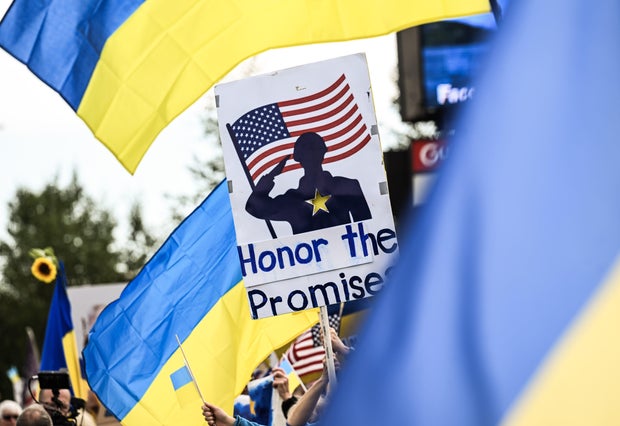
In his interview with Fox News anchor Bret Baier on Air Force One, Mr. Trump said he is looking to come away from the meeting with an agreement to end the fighting in Ukraine.
"I won't be happy if I walk away without some form of a ceasefire," he said. "I say this, and I've said it from the beginning: This is really setting the table today. We are going to have another meeting if things work out, which will be very soon. Or we are not going to have any more meetings at all, maybe ever."
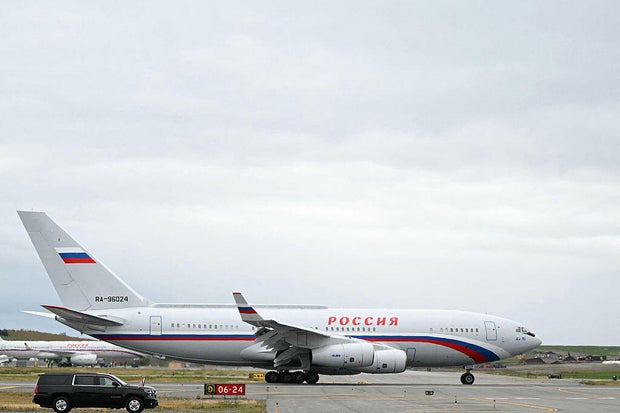
The plane carrying Putin touched down in Anchorage shortly before 11 a.m. local time. Mr. Trump was awaiting his arrival on Air Force One.
Mr. Trump remained on Air Force One after touching down to exchange greetings with Republican Sens. Lisa Murkowski and Dan Sullivan from Alaska, as well as Alaska's GOP governor, Mike Dunleavy, a White House official said.
Murkowski and Mr. Trump have not always seen eye to eye, but her votes are critical for Senate Republicans. Dunleavy has been Alaska's governor since 2018.
"Alaska is an ideal location for the Trump-Putin summit. Our state exudes all aspects of American strength— incredible military might, world-class energy reserves & our wealth of allies, many of whom are taking part in the major Arctic Edge military exercises this month in Alaska," Sullivan wrote on X ahead of the meeting.
Ukrainian President Volodymyr Zelenskyy made a statement Friday, shortly before the meeting between Mr. Trump and Putin was due to begin. Zelenskyy was not invited to the bilateral talks and spent the week leading up to the Alaska summit speaking with European allies and Mr. Trump.
"The war continues, and it is precisely because there is neither an order nor even a signal that Moscow is preparing to end this war. On the day of negotiations, they are killing as well. And that speaks volumes," Zelenskyy said.
"Russia must end the war that it itself started and has been dragging out for years," he added. " The killings must stop."
Zelenskky said he had told both the U.S. and European countries "what can truly work" to end the war, but said it will require a display of strength from the United States.
"Everything will depend on this — the Russians factor in American strength. Make no mistake — strength," he said.
Zelenskyy said security guarantees were needed for an end to the war and called for a trilateral meeting between the U.S., Ukraine and Russia.
"I thank everyone who stands with us, with our people, with Ukraine! I thank all those working for the independence of our state and for our strong positions," Zelenskyy said.
Workers at Joint Base Elmendorf-Richardson have prepared a stage with the backdrop "Pursuing Peace" in the room where the two leaders are expected to take questions after the talks. Two lecterns with the seal of the U.S. are flanked by Russian and American flags, with rows of seats for the media:
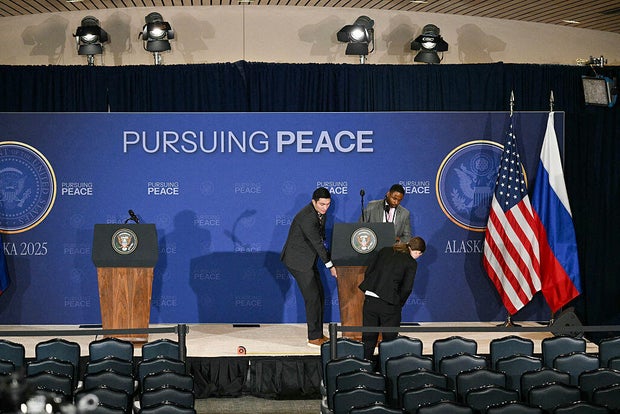
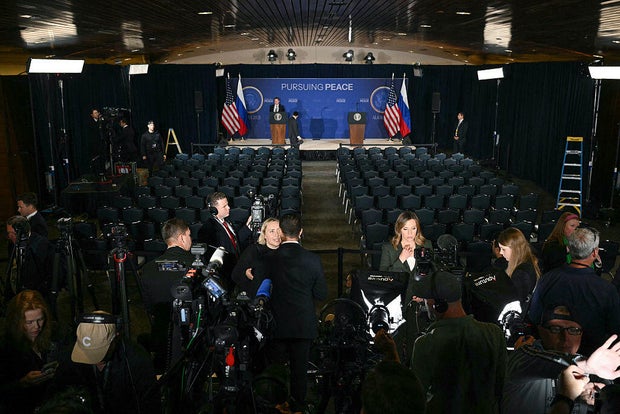
White House press secretary Karoline Leavitt said the one-on-one Trump-Putin meeting, which was originally only going to include translators, will now also include U.S. special envoy Steve Witkoff and Secretary of State Marco Rubio.
For an expanded bilateral meeting and lunch to follow, Treasury Secretary Scott Bessent, Commerce Secretary Howard Lutnick, Defense Secretary Pete Hegseth and chief of staff Susie Wiles will join Rubio and Witkoff.
White House deputy chief of staff Dan Scavino snapped a photo of Witkoff and Rubio speaking on Air Force One on the flight to Alaska.
The presence of Rubio and Witkoff may help ease the minds of outside some experts and Europeans who were wary of Mr. Trump being alone in a room with Putin, a former KGB officer.
Air Force One landed at Joint Base Elmendorf-Richardson at 10:22 a.m. local time (2:22 p.m. Eastern), after a little over six hours in the air.
The president is expected to greet Putin once the Russian leader arrives.
On the tarmac, a lengthy red carpet is flanked by four fighter jets, leading to a platform with "Alaska 2025" written on the front:
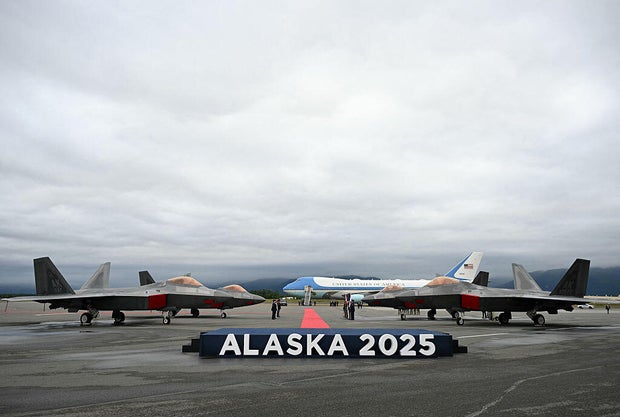
Ukraine wants an end to Russia's assault and its full withdrawal from their territory.
"There must be an honest end to the war. And it depends on Russia," Ukrainian President Volodymyr Zelenskyy said on social media earlier this month. "It is Russia that must end the war it started."
Mr. Trump said earlier this week that a ceasefire agreement between Russia and Ukraine would involve "some land swapping going on. I know that through Russia and through conversations with everybody. To the good, for the good of Ukraine. Good stuff, not bad stuff. Also, some bad stuff for both."
That prompted a response from Zelenskyy, who said Ukraine would not give up any of its territory to Russia. Ukraine's constitution does not allow him to formally cede parts of the country.
"We will not reward Russia for what it has perpetrated," Zelenskyy said in a social media post last weekend. "The answer to the Ukrainian territorial question already is in the Constitution of Ukraine. No one will deviate from this — and no one will be able to. Ukrainians will not gift their land to the occupier."
Despite such statements, John Herbst, senior director of the Atlantic Council's Eurasia Center, said Zelenskyy has demonstrated he's willing to compromise.
"There is no doubt in my mind that Zelenskyy understands that territorial concessions may be required to get a durable peace," Herbst said.
Read more here.
The Patriarch Kirill of Moscow and All Rus, the head of the Russian Orthodox Church, delivered a speech ahead of the meeting between Mr. Trump and Putin.
"Nothing can influence the development of human civilization as much as the state of (U.S.-Russia) relations. If they develop positively, then peace on the planet is ensured, and therefore the conditions for the progressive development of human civilization are also ensured," he said. "If there is no peace, if, God forbid, there is a threat of a nuclear conflict, which will entail the destruction of not only the participants in this conflict, but probably the entire human civilization, then we will come closer to nothing less than the most difficult and tragic end of the existence of the human race."
Patriarch Kirill stressed the global threat posed by any possible direct nuclear conflict between the United States and Russia, saying he believed it appeared both leaders appeared ready to develop stronger relations.
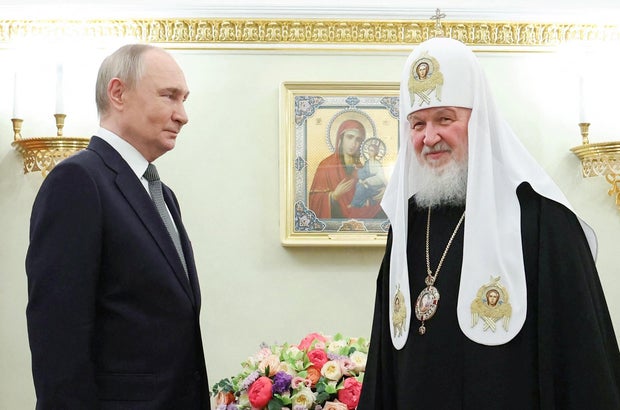
He said his congregations should pray "that the result of these negotiations would truly bring hope to people and create the preconditions for an even more dynamic development of relations between our countries, and not only between our countries, but also between Russia and the Western world."
Earlier this morning on the flight to Alaska, Mr. Trump told reporters he doesn't know what specifically would make today's summit a success.
"There's nothing set in stone," he said. "I want certain things. I want to see a ceasefire."
He continued, "Everyone said it can't be today, but I'm just saying I want the killing to stop. I'm in this to stop the killing."
Regarding talks about territory, the president said it would be discussed, "but I've got to let Ukraine make that decision, and I think they'll make a proper decision." He said that he would not be negotiating on Ukraine's behalf. "I'm here to get them at a table," he said, a reference to the possibility of a subsequent summit that would involve Russia, Ukraine and possibly other European countries.
Yulia Navalnaya, the widow of Russian opposition activist Alexei Navalny who died in February 2024 while being held in a Russian prison, said that Putin and Mr. Trump should use their meeting to agree on a prisoner exchange.
"We do not know, and you do not know, how everything will turn out after your negotiations. Maybe the results will have an impact on something. Maybe they will be forgotten in a week. But there's a way to make sure that they go down in history anyway, so the Alaska summit will be historic no matter how events unfold," Navalnaya said in a video statement released early Friday, hours before the Trump-Putin summit was due to start. "To do this, we need to do something irreversible. Something that can't disappear the next day due to some geopolitical considerations, namely: hold a new round of prisoner exchange."
Navalnaya said that the one-on-one meeting offered a unique opportunity for such an exchange, and that there would then be "no need for two years of shuttle diplomacy. I — you — know better than anyone in the world what delays in such matters are fraught with. You can simply exchange lists and release people. I know that such lists have already been prepared."
Navalnaya called for the release of "Russian activists and journalists, Ukrainian civilians, those who are in prison for antiwar statements and posts on social networks. After all, you yourselves are negotiating to end the war, so why should people who demanded exactly the same thing sit in prison? No matter how much more negotiation is required, this step will go down in history anyway. Just do it."
In an interview with Fox News on Air Force One, the president told anchor Bret Baier that he is prepared to walk away from the meeting if it does not go well.
"We're going for a meeting with President Putin in Alaska. And I think it's going to work out very well and if it doesn't, I'm going to head back home real fast," he said.
"I mean, if it doesn't, you walk?" Baier asked, according to Fox News White House correspondent Jacqui Heinrich.
"I would walk, yeah," the president replied.
Dmitry Peskov, the top spokesman for the Kremlin, told Russian media that Putin is scheduled to land in Alaska at 11 a.m. local time, or 3 p.m. EDT, and that "President Trump will be there to meet him at the plane."
"Although, of course, the main focus will be on the issue of Ukrainian settlement, there is also the list of irritants in our bilateral relations, possible economic cooperation projects, all aspects of the Ukrainian settlement, and key points on regional and international issues," Peskov said in Russian.
Peskov also said the talks could take six or seven hours, according to Russian outlet RIA Novosti. He said the two leaders would meet with aides present.
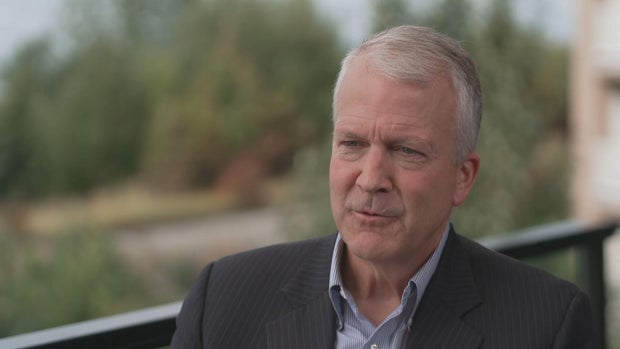
Sen. Dan Sullivan, Republican of Alaska, talked with CBS News' Margaret Brennan Thursday about why his state is "the appropriate place" for the Trump-Putin summit.
Putin, he said, "understands one thing … strength and power. And my state exudes strength and power with a huge military here." He pointed out that the U.S. is conducting military exercises in Alaska this month. U.S. Northern Command and NORAD will be in the state all month for training exercises that also include the U.K. and Denmark.
"I hope Vladimir Putin sees a lot of that military power in the next couple of days," he told Brennan, in an interview that will air on "Face the Nation with Margaret Brennan" on Sunday. "Unleashing American energy, which the President is doing. That's the weapon that Putin fears probably more than anything, when we can compete with them."
Sullivan also suggested that the locale is a good way of "reminding the Russians that we are quite good negotiators."
"You know, last time we had a big deal with Russia in America, about my state, we got this great state for two cents an acre, $7.2 million, probably the deal of the century," Sullivan said. "And I think the Russians — I think the Russians probably have to remember that, too."
- What: President Trump and Russian President Vladimir Putin meet in Alaska
- Date: Friday, Aug. 15, 2025
- Time: Coverage throughout the day. The leaders are expected to meet at around 3 p.m. EDT and hold a news conference after talks conclude, but an official schedule has not yet been announced.
- Location: Joint Base Elmendorf-Richardson in Anchorage, Alaska
- On TV: Watch Special Reports and the "CBS Evening News," anchored from Alaska, on CBS television stations (find your local station here).
- Online stream: Watch live coverage on CBS News 24/7 in the video player above and on your mobile or streaming device.
The CBS News team in Anchorage for the summit includes "CBS Evening News" anchor John Dickerson; "Face the Nation" moderator and chief foreign affairs correspondent Margaret Brennan; chief White House correspondent Nancy Cordes; and White House reporter Willie James Inman. Senior foreign correspondent Debora Patta joins from London.
Coverage will also include insights and analysis from CBS News contributors including former U.S. Ambassador to Russia John Sullivan; former Homeland Security official Samantha Vinograd; and Lt. Gen. HR McMaster, former national security adviser to President Trump.
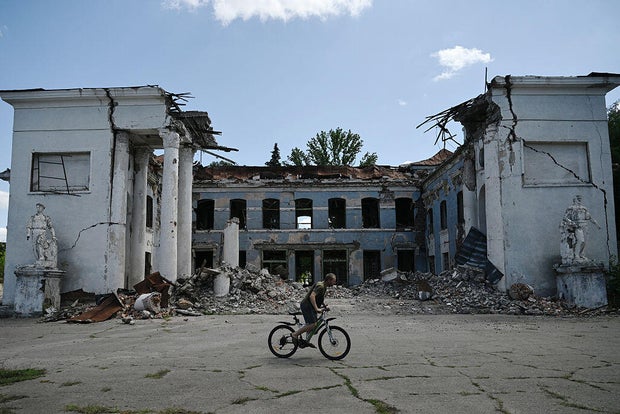
In the days leading up to the Trump-Putin summit, Russian forces breached Ukrainian lines in a series of infiltrations in the country's industrial heartland of Donetsk. Though the advances amount to only a limited success for Russia, which has not yet been able to consolidate these gains, analysts say, it's a potentially dangerous moment for Ukraine.
"The key risk for Ukraine is that the Kremlin will try to turn certain local gains on the battlefield into strategic victories at the negotiating table," said Mykola Bieleskov, a senior analyst at CBA Initiatives Center.
Asked about Russia's continued military offensive as he headed to Alaska Friday morning, Mr. Trump said Putin is "trying to set a stage. I mean, in his mind, that helps him make a better deal. It actually hurts him, but in his mind, that helps him make a better deal, if they can continue the killing."
Read more here.
The two leaders are expected to meet at around 11 a.m. local time, or 3 p.m. EDT. Alaska is four hours behind Eastern Time. The full timing of all the day's events has not yet been announced, but a spokesman for the Kremlin said the talks could last six or seven hours. Following their talks, they are expected to hold a joint news conference, which would be Friday evening on the East Coast.
The meeting is taking place at Joint Base Elmendorf-Richardson, in Anchorage, Alaska. The location is roughly midway between Washington, D.C., and Moscow.
Experts say Putin has several objectives that won't be shared by the U.S. and Ukraine, and Mr. Trump must exercise caution.
Putin would love to see the U.S. discontinue its financial support for Ukraine, said Bradley Bowman, senior director of the Foundation for Defense of Democracies' Center on Military and Political Power.
"He wants to sideline the power of the United States so that he can more effectively prey on Ukraine," Bowman said, adding that at the same time, Putin will "try to make the invaded look like the villain." While Mr. Trump aims to end the war Russia began, Putin is likely to try to seize on Mr. Trump's desire for peace.
"He's going to try to gain Trump's support for a bad peace," Bowman said, adding, "Some peace agreements are bad because they lead to more war."
John Lough, an associate fellow in the Russia and Eurasia program and the British think-tank Chatham House, predicted that Russia would "put something in front of [Trump] that he will buy into and say, 'This is a way out of the war, and I like that, and I'm now prepared to go lean on the Ukrainians again and the Europeans and we'll get this over the line.'"
Read more here.
Kathryn Watson is a politics reporter for CBS News Digital, based in Washington, D.C.
Cbs News





